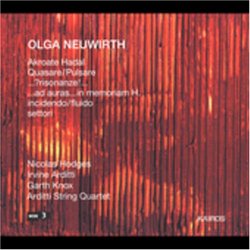| All Artists: Olga Neuwirth, Nicolas Hodges Title: Olga Neuwirth: Akroate Hadal; Quasare/Pulsare; ...?risonanze!...; etc. Members Wishing: 1 Total Copies: 0 Label: Kairos Release Date: 6/28/2005 Genres: Special Interest, Classical Styles: Experimental Music, Chamber Music, Historical Periods, Classical (c.1770-1830), Instruments, Electronic Number of Discs: 1 SwapaCD Credits: 1 UPC: 780124124621 |
Search - Olga Neuwirth, Nicolas Hodges :: Olga Neuwirth: Akroate Hadal; Quasare/Pulsare; ...?risonanze!...; etc.
 | Olga Neuwirth, Nicolas Hodges Olga Neuwirth: Akroate Hadal; Quasare/Pulsare; ...?risonanze!...; etc. Genres: Special Interest, Classical
|
Larger Image |
CD Details |
CD ReviewsA Third Viennese school? Jeremy Glazier | Columbus, OH | 04/14/2007 (5 out of 5 stars) "Olga Neuwirth is not yet 40 and has produced some of the most challenging, aggressive, and powerful music of her generation. Neuwirth recently collaborated with Elfriede Jelinek on an operatic version of David Lynch's Lost Highway. Next to her, composers as otherwise-interesting as Matthias Pintscher and Thomas Ades seem like easy listening. The chamber works on this disc are at once weighty and playful, fraught with that acute self-awareness that in lesser hands becomes self-consciousness.
Here are two string quartets and a number of smaller works, ranging in date from 1995 to 2000: for violin and piano, for solo viola d'amore, for two violins and wooden drum, and for piano and CD-player. Many of Neuwirth's scores call for "preparations" to the instruments: balls of silicone and styrofoam, paperclips and clamps, as well as intentional mis-tunings and micro-tunings, ensure that each instrument produces exactly the sound she desires. Unlike some composers who practice preparation, such as Mauricio Kagel, her intention seems to rest in the sound quality rather than in any performative or theatrical aspect. String quartet 1, "Akroate Hadal," is the first and longest piece on the disc, while string quartet 2, "settori," is the last and shortest work. According to the liner notes, "Akroate Hadal" refers to "Vilem Flusser's and Louis Bec's description of a fictitious kraken-like sea monster named 'Vampyrotheutis Infernalis' [....] Just as members of the genus 'Vampyrotheutis' display invertebrate mobility and a predilection for unbridled voracity, so the string quartet seems like an organism winding around itself, sucking back in and virtually devouring up the music it brings forth." I'm not sure whether such descriptions are useful or merely gratuitous; for me, the music has its own integrity. That integrity is amply demonstrated by repeated listening. The second quartet refracts musical material from the first quartet and produces something wholly new from it; neither sequal nor "re-make," it is more like a distortion--or, as the notes put it, "a new reading." The other pieces on the disc, while less substantial, are certainly intriguing. They offer glimpes into Neuwirth's compositional process and allow the informed lister to hear the implications of the string quartets in a smaller setting. Listen to the two quartets first, then spend some time with these smaller works before going back to the quartets for a greater understanding of one of the most original younger voices in experimental music." |

 Track Listings (6) - Disc #1
Track Listings (6) - Disc #1